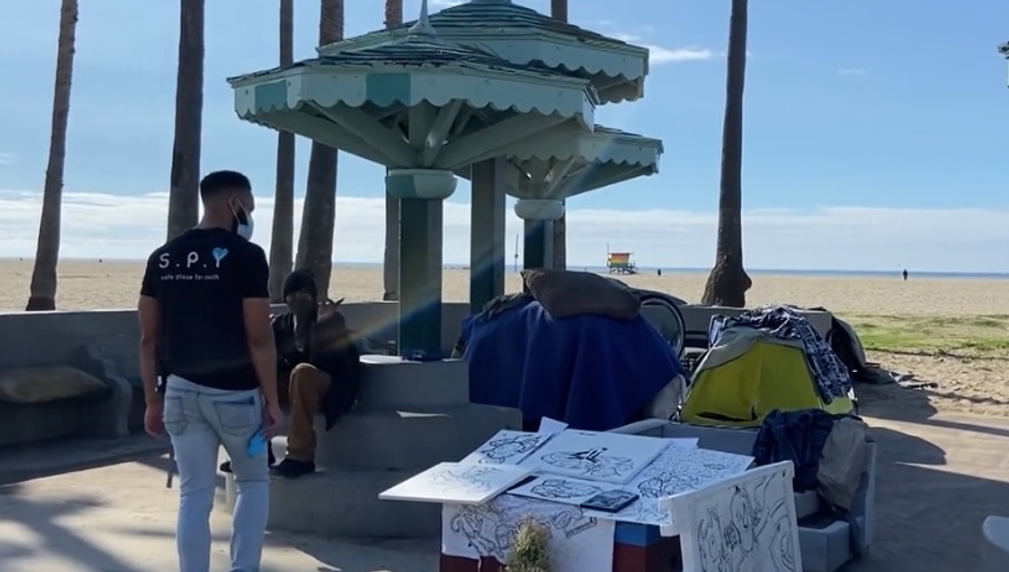Helping the Helpers
The Helping the Helpers Program is aimed at providing mental health training, self-care, and enhanced networking for the frontline heroes in homeless services. They are the boots on the ground support, yet their work often goes unnoticed and unappreciated, and they’ve recently been experiencing extreme stresses and burnout. These staff members arguably have some of the most difficult jobs, trying to assist a multi-challenged population, so we focus on supporting these incredible staff members to keep them in their jobs.

What is the primary issue area that your application will impact?
Housing and Homelessness
In which areas of Los Angeles will you be directly working?
West LA
In what stage of innovation is this project, program, or initiative?
Expand existing project, program, or initiative
What is your understanding of the issue that you are seeking to address?
Joe S graduated with a degree and a vision to help our city’s most vulnerable. Then the pandemic hit. Joe saw his clients deteriorating and dying. After suffering from work related depression, he gave up on outreach work. His experience is not an isolated one. According to the 5th annual “Global State of Frontline Work Experience Study” 50% of frontline workers are contemplating leaving their jobs. 58% cite burnout as the #1 reason. In homeless services, outreach workers are trained in trauma-informed care but in the context of their clients. We focus on the job-related trauma that the staff members experience. With a profound shortage of housing, their clients are deteriorating and dying before a unit is available. This takes an overwhelming toll on staff. Additionally, staff are reporting health challenges- depression, anxiety, trauma, and burnout due to the challenges of their jobs. When staff suffers, it affects the unhoused, the agencies, and ultimately, the communities.
Describe the project, program, or initiative this grant will support to address the issue.
California has the highest number of homeless in the US. In LA alone, Los Angeles Homeless Services Authority (LAHSA) reports at least 63,700 unhoused living on our streets. Outreach is one of our city’s most difficult and demanding jobs, and agencies are losing staff at an alarming rate. In 2021, Westside Coalition identified a gap in services, and we were one of the first non-profits to offer self-care for the staff of our agencies. Our plan forward is to continue to provide free trauma informed care trainings and support to our frontline staff. We will have a mental health professional lead each training. We will also teach varied self-care modalities, knowing not everyone is drawn to yoga or meditation. This allows attendees to choose what works best for them. And we will provide enhanced networking. Having a peer who understands the same challenges provides an additional level of support. Each training can stand alone but each topic will build upon the overall program. For those who can’t attend our trainings at the designated times, we will upload YouTube videos to our website so they can participate on their own time. This program has been met with great success in 2021, and we plan to continue it indefinitely. Supporting frontline workers will not only benefit the staff members, but their clients, agencies and ultimately the communities. Our aim in supporting these heroes is to help them stay in their jobs and flourish, so our communities can flourish once again.
Describe how Los Angeles County will be different if your work is successful.
With a vast population of unhoused in LA that continues to grow, the outreach workers are an essential component to keep our city operational. If we lose them, we will lose our fight against homelessness. What the public doesn’t realize is that a shortage of outreach is one of the main reasons for our homeless crisis. No amount of housing and shelter beds can help if there are no outreach workers to take on the cases- to help people get IDs, clothing, food, jobs, and services. It is needed to help the displaced take the necessary steps to go from the streets to shelters. We have to improve the working conditions for our service providers to keep them in their jobs. The first step in doing that is to do welfare checks. For our staff to help others, it’s important they don’t forget to help themselves first. Our trainings will ensure our staff cares for themselves as they care for others. This will encourage them to remain in their jobs so they can continue the essential work they do.
What evidence do you have that this project, program, or initiative is or will be successful, and how will you define and measure success?
Our Helping the Helpers Program was a pilot program launched in 2021 when Westside Coalition discovered a gap in services regarding the wellness and welfare of our agencies’ staff. The program was funded by the Los Angeles Department of Mental Health. Through our evaluations and metrics, we were able to determine what was most helpful and what areas of our trainings needed work. We have a diverse community of staff members, and based on our assessments, our trainings were beneficial to people of all races and genders. With more funding, we will be able to expand our program and bring in even more resources and training modules. Throughout the first year, we were able to determine what trainings the staff found most beneficial, and with our surveys, we were able to pivot to make our program even more beneficial in the coming years. We will continue to conduct surveys and interviews, to ensure our program meets the highest success rate possible and reassess when needed.
Approximately how many people will be impacted by this project, program, or initiative?
Direct Impact: 1,200
Indirect Impact: 518,000